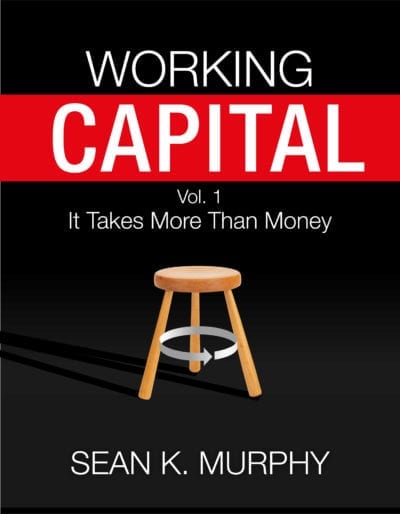Bob Biglin, CEO of the Center for Advanced Emotional Intelligence, offers a review of “Working Capital: It Takes More than Money.”
Bob Biglin’s Review of Working Capital: It Takes More Than Money
Below is an email from Bob Biglin, a serial intrapreneur and CEO at The Center for Advanced Emotional Intelligence.
 There are many, many valuable nuggets I highlighted in the book. I’ll share a few of my favorites:
There are many, many valuable nuggets I highlighted in the book. I’ll share a few of my favorites:
- Treat your hypothesis as a probability estimate: YES! Far too much emphasis is placed on binary outcomes driven by deterministic and reductive thinking. The world doesn’t work on binary outcomes.
- Drafting your origin story: a great exercise to help remind people of the original concepts and ideas which led to them starting this business.
- Funding: I greatly appreciate the focus on the broader possibilities available to entrepreneurs.
- The whole section on “Don’t Forget Your Day Job” is a really important section. It reinforces key guidance that an entrepreneur should continue at their day job until they’ve worked at least through the concept and customer discovery processes. This often gets overshadowed by the “follow your passion” nonsense.
- The entire “Intellectual Capital” section is very helpful. Most of the trade press on IP and startups either direct people to put a fence around everything driven by paranoia or is vague or unspecific. The book treats this section with the right balance between the legalistic side of IP with the practical application of it. I particularly like the step to catalog prior failures. We try to do this when we conduct After-Action Reviews after each client engagement, but this spurred me to think about this more broadly, beyond the individual client events.
- Communities of practice appear in a couple of areas–Intellectual Capital and Social Capital– both for the good of the enterprise and for the good of the entrepreneur. They are a pragmatic approach to dealing with the challenge of helping people move beyond their “strong ties” to capitalize on the power of “weak ties.”
- In the section on trust, the book discusses predictability and authenticity. I also like to emphasize the importance of people having a consistent set of experiences when they interact with a person or organization. The predictability comes from engaging with a person or group who is consistent in their behaviors, commitments, and values.
- The “Tips for Building Conversations” is an excellent primer on the fundamentals of good networking behavior. I particularly liked the point about “borrowing credibility” from a referral.
- The “Taking Stock” section should be something that every company does regularly–at least annually and triggered by events such as a significant move by a competitor or the beginning or conclusion of a significant project.
- The Planning section is excellent! I was glad to see it recognized the realities of managing based on cash flow.
About Bob Biglin, CEO, The Center for Advanced Emotional Intelligence (AEI)
AEI partners with senior leaders and their organizations to help them build thriving businesses and high performing teams. Bob integrates his experience as an operating executive with formal study as a coach and organizational consultant, working with senior leaders to help them build greater awareness of their strengths, identify how to best leverage those strengths, and to more effectively lead their organizations. AEI’s goal is to help their clients to build and mobilize strong, resilient, high-performing organizations.
Where to Purchase “Working Capital: It Takes More Than Money”
- Amazon Kindle: https://www.amazon.com/Working-Capital-Takes-More-Money-ebook/dp/B08NZSYNV4/
- Apple E-book: https://books.apple.com/us/book/id1541499346
- Amazon Paperback – coming soon
Related Blog Posts
- SKMurphy Page for “Working Capital: It Takes More Than Money”
- A Primer on Business Assets for High Technology Startups
- A Practical Introduction to Financial Capital for Bootstrappers
- Basics of Intellectual Property for Bootstrappers
- A Practical Introduction to Intellectual Capital For Bootstrappers
- A Practical Introduction to Social Capital for Bootstrappers
- Building, Borrowing, and Keeping Trust
- Taking Stock of Your Business Assets
- How to Leverage Current Business Assets For Growth
- A Holistic Approach to Launching a Bootstrapped Startup
